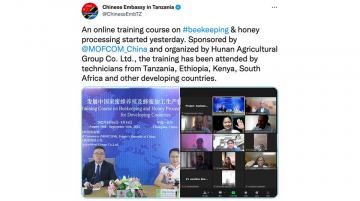
The latest policy from the Fisheries Commission in Ghana reveals that data from catch assessment surveys shows considerable levels of overfishing leading to a GDP decline from 1.5% in 2015 to 0.9% in 2019 due to overexploitation of the fisheries resources.
“Increased fishing effort in terms of the number of vessels by all fleets over the last couple of decades has not resulted in any significant increase in catches. With the exception of the tuna fleet, catch per unit effort (CPUE) of all fleets has been declining,” the report noted.
Additionally, catches per canoe have declined substantially since 2008 affecting their profitability.
This decline is fueled by the harmful practice locally known as “Saiko” which largely involves Chinese trawlers and other players fishing in zones meant for small-scale fishers and then transferring the catch to specially adapted boats far offshore which then sell the fish in local markets.
Ghana’s Ministry of Fisheries notes that the decline is creating widespread concerns about the decreasing fish stocks. The National Policy for the Management of the Marine Fisheries Sector 2022 – 2026 highlights data from fish landing sites monitored by the Fisheries Scientific Survey Division indicating that fish sizes now are much smaller.
Through Saiko, an estimated 1,00,000 tons of fish are traded annually in contravention of laws and procedures laid out by Ghana’s fisheries ministry. The nature and scale of the practice show that apart from Chinese vessels, there are others from South Korea, Senegal, Liberia, Gambia, and Sierra Leone among those that have been intercepted engaging in questionable fishing practices.
Saiko’s indiscriminate nature threatens a stock collapse of the small pelagic fish that live neither close to the bottom of the ocean nor near the surface but somewhere in the middle. Larger fish, seabirds, and marine mammals feed on these pelagics and thus their reduction or extinction threatens not only the marine life that depends on them but also the fishermen.
Nana Kweigyah, an artisanal fisherman and canoe owner in Ghana is worried that his trade faces an uncertain future due to the illegal fishing and overfishing by commercial Chinese fishing vessels in a sector that is ridden by corruption and poor governance.
The effect of these threats is that he not only has to go further into the sea to make a catch but he also has to cast his fishing gear deeper. Nana said that they used to have a good catch at a depth equivalent to 23-25 stretched arms (10-20 meters) but “now you need to go to a depth equivalent to 35 stretched arms (65M) and even beyond to get fish.”
The fisherman also has to spend more time out at sea now than he did previously, a claim supported by Kofi Agbogah, Executive Director of Hεn Mpoano, a not-for-profit organization in Ghana.
“In the past fishers used to do a half day or a day’s trip and return with good harvest. Today, they may spend three days to a week to return a satisfactory harvest. In the worst case, they return with empty nets,” he said.
Foreign vessels involved in illegal fishing in Ghana’s territorial waters operate brazenly despite Ghana’s law requiring that all trawlers must be Ghanaian-owned and fly the Ghanaian flag.
“Technically, all the vessels are Ghanaian owned. However, some Ghanaian counterparts claim to go into hire purchase agreements with some Chinese companies or owners. Since such agreements remain confidential and not in the public domain, they are not part of the disclosures in the vessel registry,” Agbogah noted.
The law provides that the proportion of foreigners and Ghanaians on each vessel must be at a ratio of 25 to 75% respectively. While this requirement is respected, he said that foreign owners, including the Chinese and Ghanaian seafarers control all activities on board the trawl vessels meaning that whatever happens on the trawlers remains on those vessels.
Even though several reports indicate that illegal fishing is perpetuated by Chinese vessels, Agbogah highlighted that these illegal activities are enabled by Ghanaian vessel owners and lax law enforcement in the sector. Basically, every fisherman in Ghana is engaged in illegal fishing.
In some instances, and not limited to Ghana, the Chinese Ministry of Agriculture (MoA) has taken action against some of the vessels.
With the potential threat to the marine food chain, Agbogah, who is also the Chairman of the Ghana Blue Economy Committee, added that illegal fishing is a challenge to Ghana’s nascent blue economy since compromised government officials take their cut long before the illegal trawlers get into Ghana. If the vessels are already in Ghana, the cut for the politician may be in the form of fish caught where a certain amount of money from the catch is given to them and then they look the other way instead of enforcing the laws.
He noted that while local fishermen do not want to see the Chinese trawlers in their waters, nothing will happen until those charged with ensuring that fishing is done correctly are high-integrity individuals.









